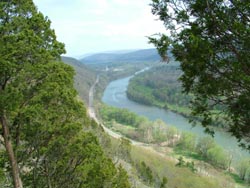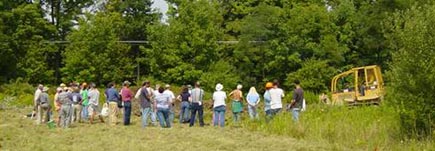We are also getting valuable information about how wetlands attenuate floods, and the ability of riparian buffers and wetland plants to absorb nutrients thus reducing runoff to streams and ultimately the river. A watershed with five percent wetlands can have a 50 percent reduction in peak flood flows. That is a solution.
-Melissa Yearick, USC Wetlands Coordinator
Why is this Watershed Special?

The Susquehanna River is the nation's 16th largest river and provides fifty percent of the freshwater to the Chesapeake Bay. The Upper Susquehanna Basin, beginning at the headwaters in New York, is comprised of 94 sub-watersheds encompassing an area of 7,500 square miles. The land use in its headwaters is predominately rural, a mixture of forest, agriculture, and two metropolitan areas. Steep gradients characterize the rolling hillside landscapes, but also produce flooding conditions and erosion. Land uses in the upper watershed, especially agriculture, directly impact downstream water quality; consequently, New York State is integrating the Targeted Watershed Grant activities with its Chesapeake Bay restoration efforts.
Environmental Challenges:
- Flooding events-due to a combination of steep topography and land use conversion-adversely impact water quality and local ecology as well as threaten human life and property.
- Sediment and nutrient runoff are the major water quality problems, especially downstream where they contribute to low dissolved oxygen levels in the Chesapeake Bay-harming fish, crabs and other aquatic life.
Progress and Goals for the Future
The Upper Susquehanna Coalition is demonstrating water quality improvements through a series of innovative projects and activities. They will:
- Implement a watershed-based wetland restoration program to reduce flooding and restore important wetland functions and values. To date, more than 30 potential sites have been identified.
- Conduct stream restoration using natural stream design.
- Promote farm stewardship through a riparian buffer initiative.
- Expand the use of a specialized Geographic Information System to target restoration activities.
- Form a College Internship/Research Program to leverage talent and build local capacity.
- Establish "County Coalitions" to demonstrate and share best management practices for controlling storm water.
- Develop unpaved road and road ditch improvement plans, including training for highway personnel on new techniques to manage runoff.
A Strong Partnership for Change
The Upper Susquehanna Coalition, which includes representatives from 11 counties in New York and three in Pennsylvania, is working in collaboration with numerous local, state and federal partners, including:
- Soil and Water Conservation Districts
- The Chesapeake Bay Program
- Pennsylvania State, Binghamton and Cornell Universities
- Environmental organizations, including the Chesapeake Bay Foundation, Trout Unlimited, Izaak Walton League of America, Ducks Unlimited and the Alliance for the Chesapeake Bay
- State agencies
- Federal agencies
- Town and County highway departments, planning departments and environmental management agencies
- Local watershed associations

Representatives of the Chemung County (local) Soil and Water Conservation District, USC employees, Ducks Unlimited, and a representative from the Town of Southport Drainage Committee inspect a wetland site. 

Intensive rotational grazing, which includes riparian buffers, will help protect water quality.

Partners accept the check for the Targeted Watershed Grant.
 Print
Print Email
Email







